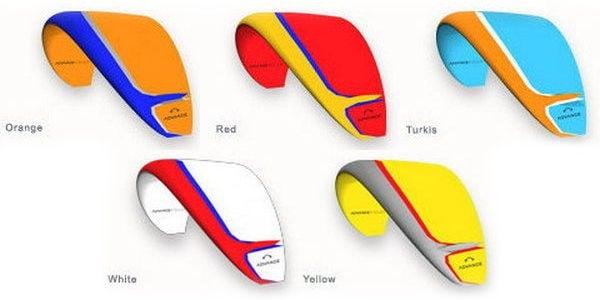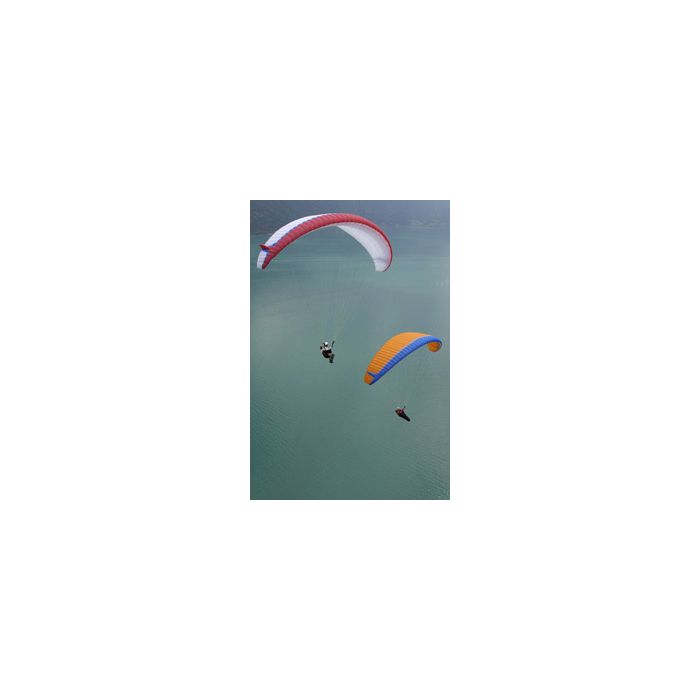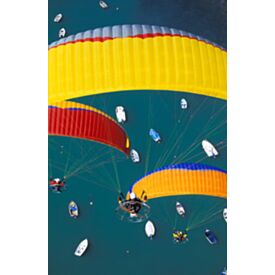EPSILON 5 - Discover a new Horizon!
The EPSILON 5 is aimed primarily at occasional pilots with a preference for thermal flights and helps them expand their flying horizons. The balanced ADVANCE handling together with the wing’s high intrinsic stability make lengthy thermal flights pure pleasure. The excellent performance increases the appeal of the EPSILON 5 for pilots switching from a higher class. The enormous margin of passive safety means that the DHV 1-2 glider can also be flown by talented beginners.
The Epsilon 5 is a superb wing for long thermal flights, its high performance making it ideal for cross-country flying. Because of its performance profile, we were able to reduce the aspect ratio, thus making this glider comfortable to fly for less experienced pilots as well.
This product has been developed under the supervision of Thomas Ripplinger, who has overseen both the development and testing of the EPSILON 5 by the following ADVANCE test pilots: Kari Eisenhut, Chrigel Mauer, Andi Aebi, Andy Hediger, Ewa Wisnierska and Steve Cox. The Team required 14 months and 12 prototype stages in order to finalise the Epsilon 5 as a wing worthy of the renowned Advance quality.
Features of the new EPSILON 5:
- excellent handling in thermal conditions
- high passive safety
- high intrinsic stability
- flawless take-off characteristics
- good performance even in accelerated flight
The EPSILON 5 at a glance
Flawless take off characteristics and smooth handling in thermic conditions
- The profile offers a very good “thermal bite”
- The glider behaves in a well-mannered way in response to exaggerated steering inputs
- Clear increasing brake pressure before a full stall
- Due to the reduced aspect ratio, this glider is very comfortable to fly in bumpy thermals
High performance up to top speed
- The line geometry has been refined for the EPSILON 5. A reduction in total line material means less drag, improved line control and effective translation of the speed system to the wing profile
- The new line geometry offers a better performance all the way up to top speed
Pitch stability & great amount of passive safety
- The wing is very stable; it reopens after massive collapses very quickly but without aggressive actions.
- Together with the internal compression straps, the closed cells increase the stability of the wing without any detrimental effect on the reopening of the wing after a collapse.
- The wing incorporates an aerofoil 'twist' in the front section of the wing along it's span. Our tests show that this significantly reduces the magnitude of assymetric collapses.
- The chosen wing profile offers a very high stability up to the top speed of the glider.
Accurate take off behaviour
- The line geometry incorporates only two line levels in the central area of the EPSILON 5. This allows for quick and easy sorting of the lines.
- The wing is suited to effortless forward and reverse inflations.
- The canopy inflates quickly even in calm conditions and lifts evenly without hanging back or overshooting
Innovations
A few of the many innovations of the Epsilon 5...
Efficient big ear system and optimized risers
- The EPSILON 5 features a totally new design of separated A-risers.
- Due to our innovative Quick-Snap system, the A-risers are automatically snapped together. They separate from each other following take off to assume the correct position ensuring a proper and precise wing profile.
- The optimized risers permit easy ground handling.
- Together with the new line geometry, these risers allow very easy activation of the ‘big ears’ manoeuvre.
- These risers are supplied in two different lengths depending on wing size. For easier and safer handling for smaller pilots, canopy sizes 23 and 25 are equipped with shorter risers (difference 4 cm), and smaller brake handles than the canopy sizes 28 and 31.
Designed with body size in mind
The EPSILON 5 is fitted with risers of different length depending on the canopy size, so that even small pilots can reach them at all times. The size of the brake handles also varies according to canopy size.
Enhanced Speed & Performance Indicator (SPI)
The EPSILON 5 speed system enables an increase in speed of up to 10 km/hr. The system is designed in such a way that on pressing the speed system, the A, B and C risers shorten by different amounts allowing an optimum canopy form to be maintained even in accelerated flight.
The system is very smooth in operation and enables an excellent glide performance, even at high speeds.
The transition from performance-optimized flying to speed-optimized flying takes place continuously and not abruptly - this is clarified by the progressive change down the scale.
More efficient acceleration system
The pretension ratio of the A, B and C levels has been precisely tailored to the profile by exhaustive calculations. This brings about an improvement in performance as well as canopy stability in accelerated flight. The latter makes it possible to exploit the entire speed range with the EPSILON 5, even in turbulent air.
New line geometry
Thanks to a refined line geometry, it has been possible to reduce the intermediate line groups of the EPSILON 5 to two levels. The overall decrease in line length brings about a reduction in drag and improves line sorting on the ground. During big ears, the new line geometry enables more extensive collapsing of the wingtips, with a significant improvement in the effectiveness of the manoeuvre.
Other details
Advance are reknowned for their great attention to detail...
Brake Line Swivels & Dirt Removal Holes
The brake line swivel is another innovative idea from ADVANCE. It prevents the brake lines from twisting up if you usually fly with a wrap.
The hook and loop fastener openings at the wing tips make the removal of dirt and debris much easier.
 Leading Edge Design & Winglets
Leading Edge Design & Winglets
Mylar reinforced cell walls and leading edge for an easy take off. The leading edge of the canopy is pre-shaped ready for inflation on the ground due to the layout of the reinforcing. The stability in accelerated flight is enhanced due to this reinforcing.
The partly closed cells make the leading edge more solid and the air circulation and pressures in the glider are more evenly distributed.
All the stitching is internal to prevent the seams from wear.
The winglets, which are an important aerodynamic element, are a trademark of our wings. They reduce the turbulence at the wingtip (Vortex-effect) and can improve the handling.
Sizes & Weight Ranges
Here below are the sizes and weight ranges for the Advance Epsilon 5...
Size
|
All-Up Weight Range
|
| Epsilon 5-23 |
55-75 Kg |
| Epsilon 5-25 |
65-88 Kg |
| Epsilon 5-28 |
78-106 Kg |
| Epsilon 5-31 |
96-130 Kg |
Technical details
Size
|
|
23
|
25
|
28
|
31
|
|
Flat surface
|
m2
|
23.35
|
25.26
|
28.10
|
31.37
|
|
Projected surface
|
m2
|
20.12
|
21.76
|
24.21
|
27.03
|
|
Span
|
m
|
10.81
|
11.24
|
11.85
|
12.52
|
|
Projected span
|
m
|
8.68
|
9.03
|
9.52
|
10.06
|
|
Aspect ratio
|
|
5.00
|
5.00
|
5.00
|
5.00
|
|
Projected aspect ratio
|
|
3.75
|
3.75
|
3.75
|
3.75
|
|
Max chord
|
m
|
2.69
|
2.80
|
2.95
|
3.12
|
|
Min chord
|
m
|
0.62
|
0.64
|
0.68
|
0.72
|
|
Number of cells
|
|
50
|
50
|
50
|
50
|
|
Take off weight (pilot, wing, equipment)
|
kg
|
55 – 75
|
65 – 88
|
78 – 106
|
96 - 130
|
|
Weight of the glider
|
kg
|
5.5
|
5.8
|
6.4
|
6.95
|
|
Maxi length of the lines with the risers
|
m
|
6.70
|
6.97
|
7.35
|
7.77
|
|
Min speed **
|
km/h
|
23 (+/- 1)
|
|
Max speed without speed-system **
|
km/h
|
38 (+/- 2)
|
|
Max speed with speed-system **
|
km/h
|
48 (+/- 2)
|
|
Min sink rate **
|
m/s
|
1.2
|
|
Glide *
|
|
8.7 (+/- 0.2)
|
Surface, span and aspect ratio are calculated from the computer and are measured on the axis of the profile.
* The performance data for the glide angle are dependant upon the position of the pilot, the aerodynamic style of the harness and the type of clothing worn (eg: speedarms).
** The performance data for sink rate and speed are measures of central tendency and change depending of the load ratio
|
Upper surfaces, leading edge and cell ribs
|
Nylon NCV New Skytex 6.6, 44 gr/m2
|
|
Lower surfaces
|
Nylon NCV New Skytex 6.6, 40 gr/m2
|
|
Reinforcement of the leading edge and trailing edge
|
Polyester / Mylar 20 mm
|
|
Reinforcement of the leading edge lower surface
|
Polyamid 16 mm
|
|
Suspension lines
|
- Liros, Dynema 0.95 mm (1st level)
- Liros, Dynema 1.15 mm (2nd level)
- Edelrid, Aramid 2.1 mm / 1.9 mm / 1.5 mm (3rd level)
|
|
Risers
|
Polyester 22 mm, 1100 kg
|
|
Quick links
|
Inox 3,5 mm, 750 kg
|
|
Stitching thread
|
Polyester
|
User manual EPSILON 5
Here you can download the user manual including lineplan, detailed description and maintenance control.
Advance EPSILON 5 manual (PDF)
Certification
Our R & D Team considers the certification tests from the start of the development process. But to be fully satisfied with the wing - behaviour, pleasure, performance - remains our first priority.
All sizes of the EPSILON 5 are certified according to LTF/DHV 1-2 requirements, with the speed system.
Advance Epsilon 5 Paramotor
Thanks to its predictable take-off behaviour, high passive safety and great stability, the EPSILON 5 is ideally suited for powered paragliding. The 25, 28 and 31 sizes equipped with paramotor risers have been approved for powered flight by the German Ultralight Flying Association (DULV). Find our more
Colours
Colours: Orange, Red, Turkis, White, Yellow.

Name
|
Leading edge + winglet
|
Strip
|
Main colour
|
| Orange |
blue |
grey |
orange |
| Red |
gold |
blue |
red |
| Turkis |
orange |
white |
turkis |
| White |
red |
blue |
white |
| Yellow |
grey |
red |
yellow |
 The displayed colours may differ from the colours in real life due to monitor display.
The displayed colours may differ from the colours in real life due to monitor display.



 Leading Edge Design & Winglets
Leading Edge Design & Winglets
 The displayed colours may differ from the colours in real life due to monitor display.
The displayed colours may differ from the colours in real life due to monitor display.


